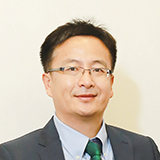May 2021 | Volume 22 No. 2
Engineer of Growth
HKU may be ranked among the top universities in the world (22nd by Quacquarelli Symonds), but like everywhere in Hong Kong, its provision of space is anything but world-beating.
Engineering and science labs and offices, for instance, are squeezed into spaces that are a half or less that provided in many other top universities. Even senior management make do with offices that cannot accommodate meetings of more than two or three people.
Imagine, therefore, what the University could achieve if it had more facilities and staff. This is the enviable challenge facing the new Vice-President and Pro-Vice-Chancellor (Research), Professor Max Shen, who comes to HKU with a strong reputation in industrial engineering and system optimisation and 16 years as a professor at the University of California, Berkeley.
“HKU is a top-notch university, however, we can still make improvements in many areas, including our research productivity. When we examine the data closely, we realise that many of our professors lack resources. They can’t afford to maintain large research groups, which for many academic areas, are essential for conducting high-impact, large-scale research projects,” he said.
That situation is about to change. The Hong Kong government and the University are investing to attract more research talent, including professors and PhD students. The University is also negotiating for more space in Shenzhen. Professor Shen will be closely involved in both initiatives, which he believes will take HKU to new heights.
Recruiting to expand
“We are in a unique position to attract the best talents here. In other places, like the US, many universities are recruiting just to replace retired faculty. But here, we are recruiting with the purpose of getting more faculty. This is really exciting,” he said.
The outcome of that will be better research productivity and greater impact. “I don’t want to encourage people to count beans, but I think we’re lacking in policy to encourage people to work on bigger and more impactful research. I want to look into incentives for that. I will listen and try to help our researchers get the resources they need,” he said.
Professor Shen acknowledges that many faculties are already performing strongly, but the Science and Engineering Faculties, in particular, lack space.
To expand capacity, the University plans to build the Tech Landmark, consisting of four buildings housing 10 interdisciplinary research institutes. But even when all four are built, he cautions that more space is still needed. The negotiations with Shenzhen for a second campus there will make room for growth.
“The idea is one university, two campuses, and students and professors could travel freely between the two. We have a beautiful campus here in Hong Kong but little space for new buildings. I feel if we can work with the Greater Bay Area and get more resources and build more labs, we will help HKU’s research really take off and attract more talent,” he said. “It is like a snowball effect, once the ball gets rolling, it will pick up speed.”
Data drive
Professor Shen is also intent on plugging research gaps. He is personally involved in setting up an institute of data science at HKU – something many top and local universities already have in place. A few hundred scholars from around the world have applied to join the institute, including several leaders in their fields. The plan is to recruit 20–30 researchers in computer science, applied mathematics, statistics and optimisation, who will develop tools and systems that can be applied to many disciplines, from science and engineering to medicine, social science and the humanities.
“We have a late start, but we also have the unique opportunity to catch up and lead. With this institute, we can unify all researchers on data-related topics and make a huge impact,” he said.
Professor Shen says he would also like researchers to continue to address the difficult topics facing Hong Kong during this time of transition. “We need them to come up with ideas to guide governments on what the best way is for Hong Kong society to move forward. This is a sensitive subject, but I think we have to encourage researchers to work in these areas.”
All told, with more space and resources, plus fine-tuning recruitment of graduate students, Professor Shen believes HKU will be an appealing option for top candidates. “You have a great city in Hong Kong, with great people, it’s safe and enjoyable and really liveable, and now we have resources for top researchers. Who wouldn’t want to come?”
Professor Shen is a case in point. “I could have stayed at Berkeley on cruising speed and gone a long way. But now, I have the responsibility to figure how to take HKU research to the peak. That really interests me. I feel like I have some good ideas to help research here get better.”
You have a great city in Hong Kong, with great people, it’s safe and enjoyable and really liveable, and now we have resources for top researchers.

PROFESSOR MAX SHEN

